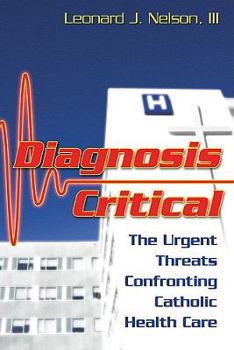Diagnosis Critical: The Urgent Threats Confronting Catholic Health Care
Select Format
Select Condition 
Book Overview
No Synopsis Available.
Format:Hardcover
Language:English
ISBN:1592760708
ISBN13:9781592760701
Release Date:June 2009
Publisher:Our Sunday Visitor
Length:350 Pages
Weight:1.56 lbs.
Dimensions:1.1" x 6.3" x 9.3"
Customer Reviews
2 ratings
"Diagnosis Critical" - a MUST read for clergy & laity
Published by Thriftbooks.com User , 14 years ago
An expert on health care law, Professor Leonard J. Nelson, III, provides an eye opening, disturbing account in "Diagnosis Critical: The Urgent Threats Confronting Catholic Healthcare." This work is divided into six parts (i.e., "Moral Foundations," "Catholic Identity," "The Struggle to Maintain Catholic Identity as Reflected in Two Health Care Systems," "Catholic Health Care and the Right of Conscientious Objection," "End-of-Life Care," "Social Justice and Health Care Reform") & a Conclusion. Professor Nelson's 229 pages of eye-opening text are readable and enthralling (He also provides 113 pages of end notes.). In his introduction, he warns that "Catholics may have to focus their future efforts on the creation of alternatives to acute care hospitals such as free clinics, specialized centers for reproductive medicine, and hospices for end-of-life care that could reinvigorate health care ministry" (p. 19). MORAL FOUNDATIONS: Within chapters on "The Catholic Natural Law Tradition," "Challenges to the Catholic Natural Law Tradition," "The Reassertion of Absolute Norms" and "Secular Bioethics versus Catholic Bioethics," Professor Nelson undertakes an ambitious history and survey of contemporary Natural Law adherents, dissenters, and acknowledged opponents. At times, he may inadvertently lend a veneer of legitimacy to dissenters, by using the term "revisionist." A more direct challenge to those who engage in sophistry to mislead Catholics into thinking that some teachings of the Magisterium are not binding (cf., # 2034 & #832 of the Catechism of the Catholic Church) would have also been appreciated. He does certainly acknowledge that "In terms of its practical effect, the widespread prevalence of dissent among both religious and lay Catholics may make it more difficult for Catholic health care institutions to persuade policymakers that they should be exempt from laws of general application requiring the provision of sterilizations and abortions. And, of course, the situation of Catholic health care institutions has become even more problematic since it has become commonplace for high-profile Catholic politicians to be openly and avowedly `pro-choice'" (p. 32). The chapter on "Ethical and Religious Directives" provides a fascinating history of the U.S. Bishops' ERDs and an often disturbing look at how they have been received: "compliance with the ERDs has been uneven when it comes to contraception and sterilization. Typically, obstetrician-gynecologists practicing in Catholic hospitals and physician office buildings owned by Catholic hospitals provide prescriptions for contraceptives to their patients" (p. 53). Kudos go to Professor Nelson, when he straightforwardly challenges the disregarding of Catholic medical ethics: * Professor Nelson reminds us that "the bishop is responsible for monitoring compliance with the ERDs in his diocese" (p.55). * "By 2003, at least two Catholic hospital systems were performing early induction of la
Required reading on the subject
Published by Thriftbooks.com User , 15 years ago
When I first saw mention of "Diagnosis Critical: The Urgent Threats Confronting Catholic Health care by Leonard J. Nelson III on Amy Welborn's blog I knew this was a book I wanted to read. The issue of Catholic Health Care has certainly emerged on this blog as I have covered stories regarding this important subject. There are plenty of comparison between Catholic health care and the Catholic education system with the decline of so-called Catholic identity. But as this author points out in his conclusion the Catholic health care system has faired better in this regard for the most part. Not that there are not major ethical problems which are certainly pointed out. The title of the book certainly gives it an urgency about the seriousness of some of the real problems. Though this is not a book containing chapter after chapter of horror stories of bad things going on in Catholic health care. The author who is a professor in a school of law and an expert surrounding healthcare law goes way beyond just detailing problems. In fact the book take as systematic approach and starts with moral theology and especially the Catholic natural law tradition. He gives a good overview of this in regards to health care along with a history of the applicable theology. As you would expect there is coverage of the theologians who have departed from traditional moral theology into relativism, proportionalism, and consequentialism which has caused damage to the culture of life in this area. In the area of bio-ethics they have tried to create a system apart from natural law that develops a consensus in the secular world. There is of course no such consensus and this area of ethics has turned more and more into defending the indefensible. The Pope in his latest encyclical addressed the problem in this area where ethics has come to mean something entirely unethical Eventually, those who dissented from Humanae Vitae realized that the traditional natural-law approach did not approved a satisfactory basis for their dissent and began to develop alternative approaches. Building on the principle of double effect, they developed a new approach that deemphasized the application of absolute moral norms. This paragraph is a very good synopsis of what has happened in theology by dissident theologians throughout the world and not just in health care. Once you separate theology from absolute moral norms than it is no surprise they find reasons that evils such as abortion, contraception, euthanasia, doctor-assisted suicide, and sterilization He spends five chapters on moral norms that ends with a discussion and history of Ethical and Religious Directives (ERDs) used in Catholic health care settings. The discussion of ERDs is actually very interesting to see how they responded to changing medical technology. They have remained consistent with the teaching of the Church. What has not been consistent is personnel in health care following them. Again and again throughout the book we ar





